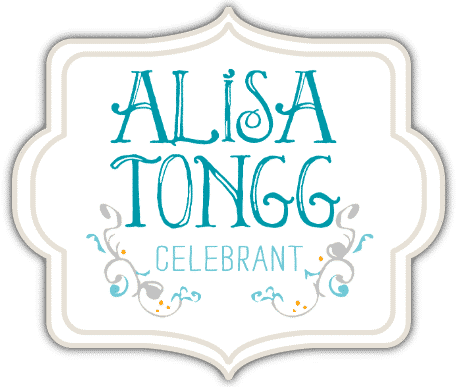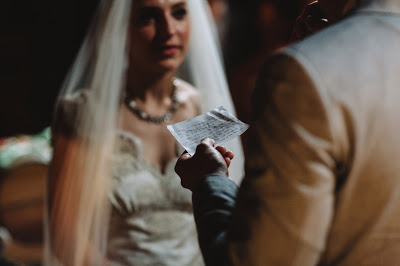I recently had the honor of contributing to Philadelphia Weddings Magazine’s “Ask an Expert” series. In their upcoming Spring/Summer 2016 issue (see page 78!), the question posed was about what options do couples have when wanting to expand on traditional vows …and what to do if both members of the couple are not on the same page as far as crafting something from scratch.
Of course this got me thinking about why so many people feel the need to write their own vows when there are so many beautiful traditional ones out there. And then…why wouldn’t someone want to write their own, every marriage is a unique partnership so shouldn’t the vows be personal too? Here’s what I put together and I hope it will serve to open possibilities for genuine connection for those about to make that journey down the aisle soon.
The good news is that you can each say different vows, there’s no rule that says you need to say the same thing as your intended during this part of the ceremony. Where your partner may feel overwhelmed with the thought of creating something new or might just be shy and would feel more comfortable keeping the vows traditional and somewhat impersonal in front of a crowd, many people feel those traditional vows don’t capture fully what modern marriages are hoping to fulfill.
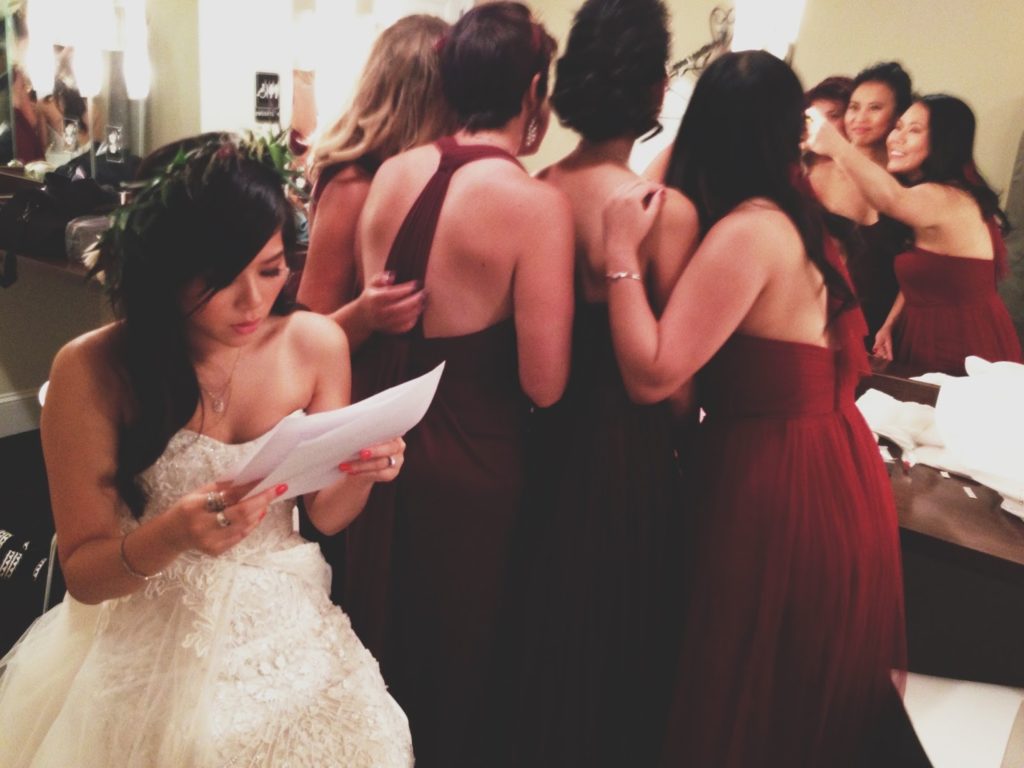
Susan going over her Vows one more time moments before the ceremony.
In my opinion, the big reason more and more couples have the desire to adapt or add to traditional vows, is that in today’s culture, we expect more from our spouse than people did 100 years ago. Today when people decide to get married, they are often marrying their best friend, lover, co-parent, career counselor, fitness and life coach, therapist and adventure partner. Because of this increased dependence on one person and relationship for fulfillment, naturally people look to add language to convey a heightened sense of commitment and responsibility to the other, not just to care for our bodies as we get older or sick, but to be a partner who will encourage us to become the best version of ourselves—a partner equally committed to enriching our lives as they are to their own.
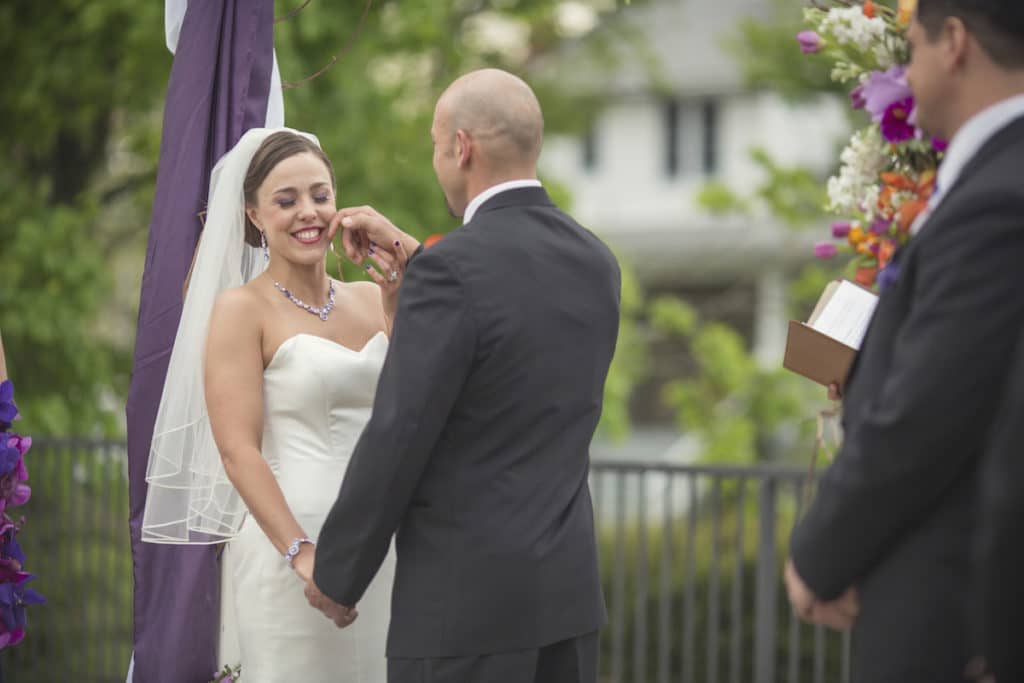
Erman wipes a tear from Lori’s cheek. Douglas Benedict Photography
In the ceremony creating process, I share a collection of my favorite vows with couples (I also send them over to a Vows board I have on Pinterest to help with brainstorming and inspiration.) Then I give them permission to select different sets, create a hybrid of the promises that most apply to their relationship and hopes for the future, switch out language so that it sounds more natural coming from them (I had a bride last year who promised to be her husband’s “Player 2 for life”). And if they want, to write something of their own.

All of these sets of traditional vows are just one paragraph in length, so when couples realize that they don’t need to write a whole letter, but 4-5 thoughtful sentences instead, writing your own vows becomes less daunting.
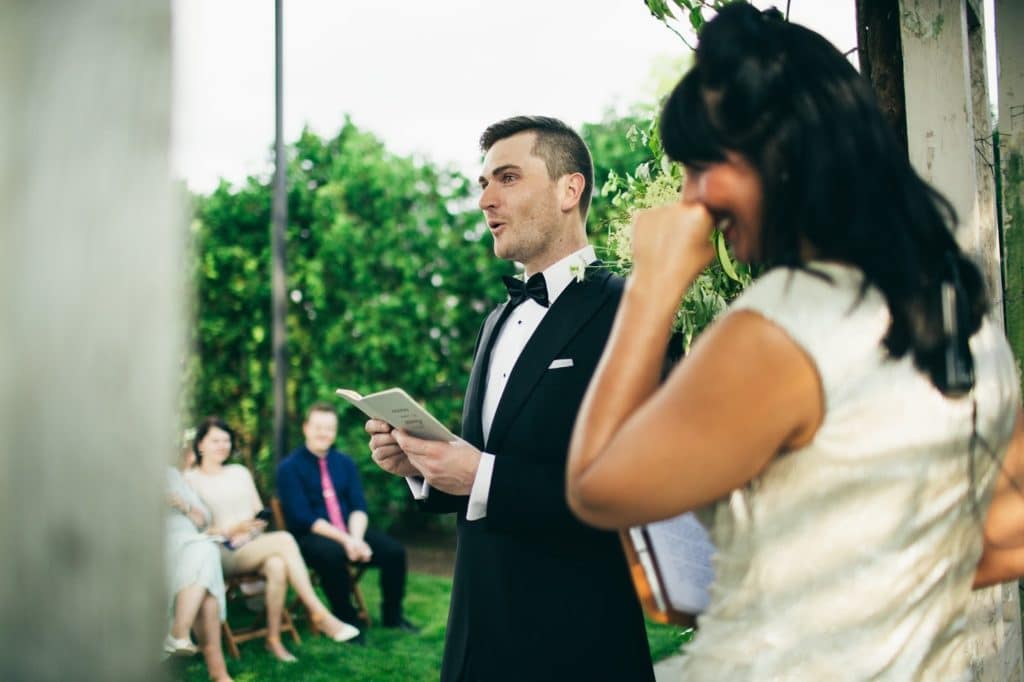
Stewart sandwiches a little humor into a gorgeous set of personal vows to Eduardo. “Because of you, I dream a whole lot bigger.” We Laugh We Love Photography
The most powerful and touching vows I’ve read, written or witnessed have come from the inspirational frame work of, What does my partner, with all of his/her fears, insecurities and hopes–most need to hear from me? What ancient wound can I be deliberate in helping my partner heal? What’s the thing you most desire but don’t have? Is it a sense of family or heritage? A father? Security/ Stability? To be seen and known? To be enough? Acceptance? To belong? Once we identify what these things are for ourselves and our partner, we can take a step to soothing whatever that anxiety is for them. We can use our vows to show that we truly understand our partner and are committed to being intentional about how we love and show up for our partner in the life ahead.
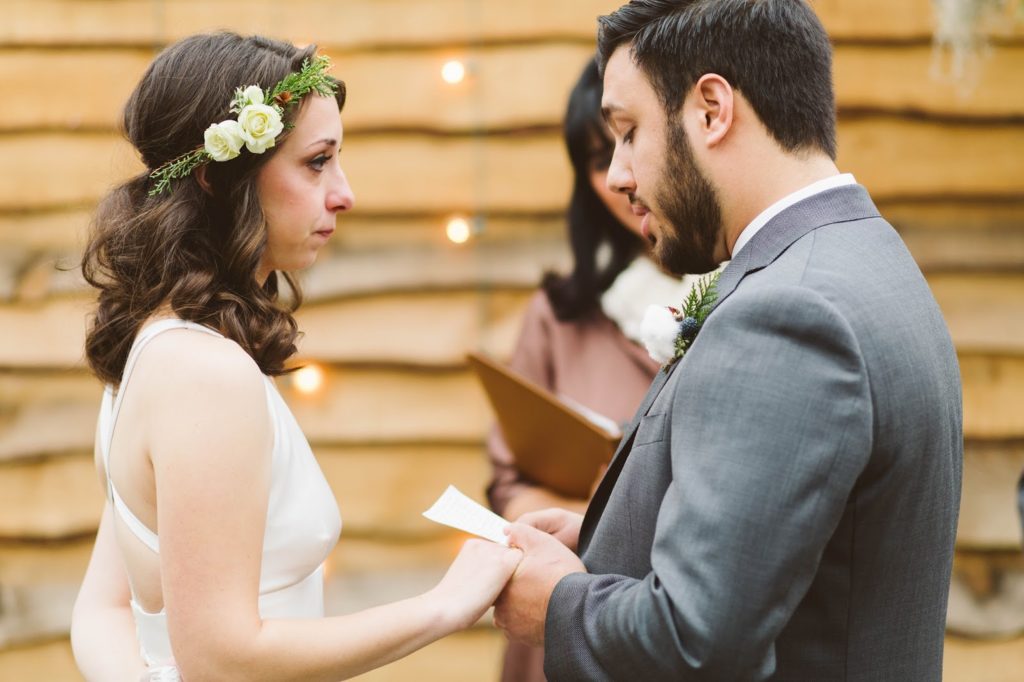
Patrick promises Laura. Sarah McKay Photography
Did your partner grow up feeling isolated and left out? Maybe you can create a vow about how you are committed to creating a home, family and rich community life with them.
Is it hard for your partner to trust others because they’ve been betrayed, abandoned or disappointed in the past? Maybe the best promise to give this person is that in all of your actions and meditations, that you will strive to be worthy of the gift of their trust.
Maybe you’re afraid that as life becomes more complicated, that you will lose the part of you that delights your partner—your spark. Most people focus on their partner when making vows, but this is an example of where it would be appropriate to make a promise about how you will respect, honor and treat yourself with kindness, acknowledging your responsibilities to offer your partner your best.
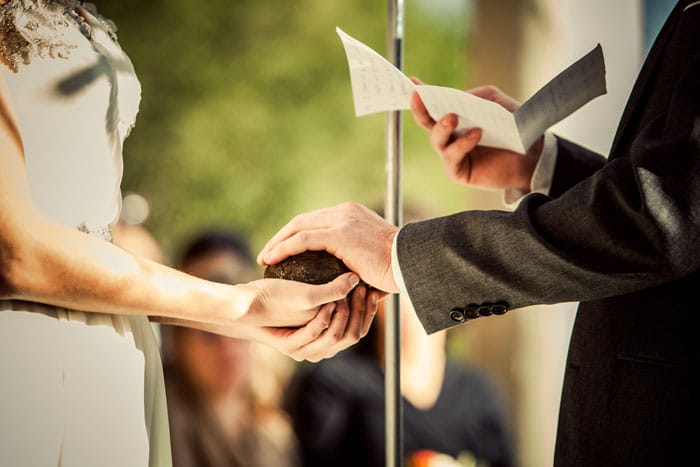
Bil Cardoni Photography
Here are some examples of ways that I’ve seen soaring language incorporated in vows, any of these promises can be added on to a set of traditional vows.
“I promise to comfort you in times of distress and celebrate your triumphs as if they were my own.” –speaks to creating an emotional as well as physical safe space, to not abandon, but instead to be fully invested in the identity and enrichment of your spouse. There’s no jealousy when their partner shines, only pride.
“I promise to listen to and learn from you, and to trust your decisions as well as respect your opinions.” –seeing your partner as a source for learning and growing, someone worthy or respect.
“I promise that I now see my family as yours, your family as mine, and look forward to loving the family we create.”
“I promise to persevere when times get tough, knowing that any challenges we might face, we will conquer them together.” –a pledge to be a true partner, to not quit. To see challenges as opportunities for strengthening relationship.
“I will cherish and protect your friendship all of my life.” –acknowledging that friendship is of utmost value and worth being proactive about developing.
“I promise to respect, admire and appreciate you for who you are, as well as for the person you wish to become.” -psychologists call this “positive illusions”, and a mental state where we assume the best about our partner’s character is thought to enhance and stabilize long term bonding.
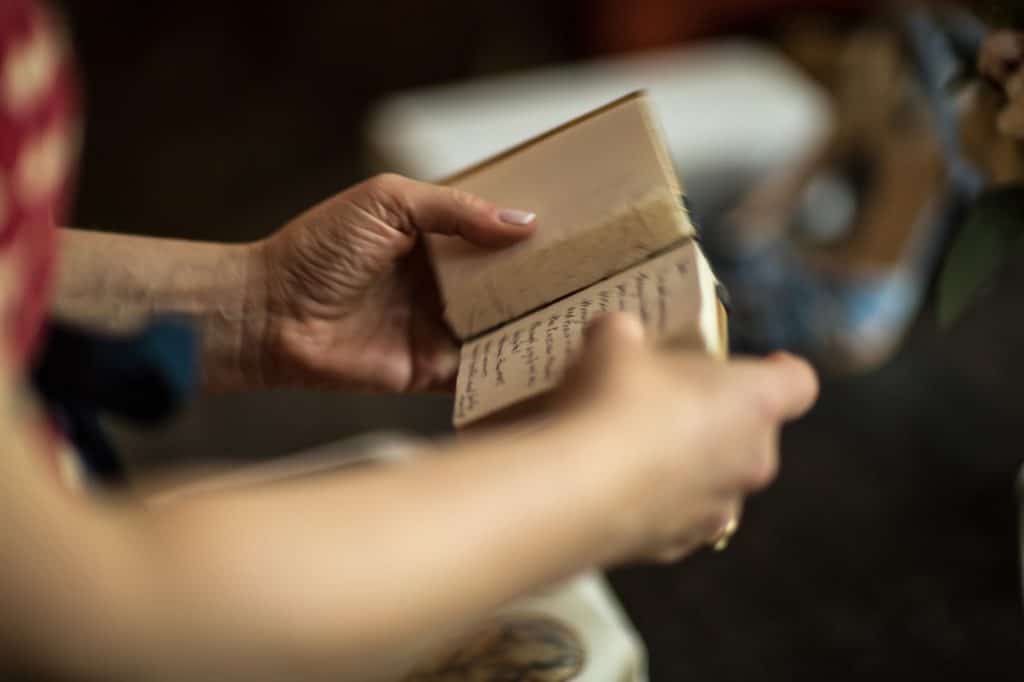
Heather’s book of promises to Nate. Jeremie Barlow Photography
Last year, Samantha Joel, a Ph.D. candidate who studies the science of relationships at the University of Toronto wrote a set of 10 vows for her own wedding based on what she knew to support a long and healthy relationship. These vows may not make a good sound bite, but they are definitely an excellent framework for how we should strive to be in relationship.
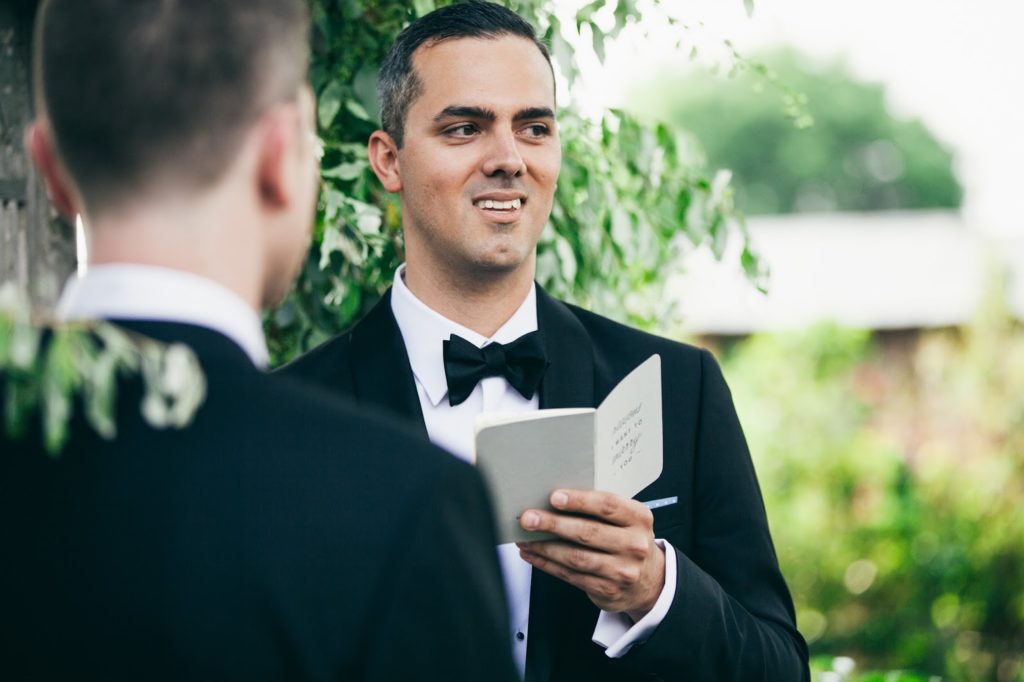
Eduardo promises Stewart “to always be your safe place, to encourage, support and believe in you.” We Laugh We Love Photography
At this particular point in time, one of my favorite set of vows comes from my friend Heather and her husband Nate, who just renewed their vows on their 20th wedding anniversary. Here’s what they continue to promise each other:
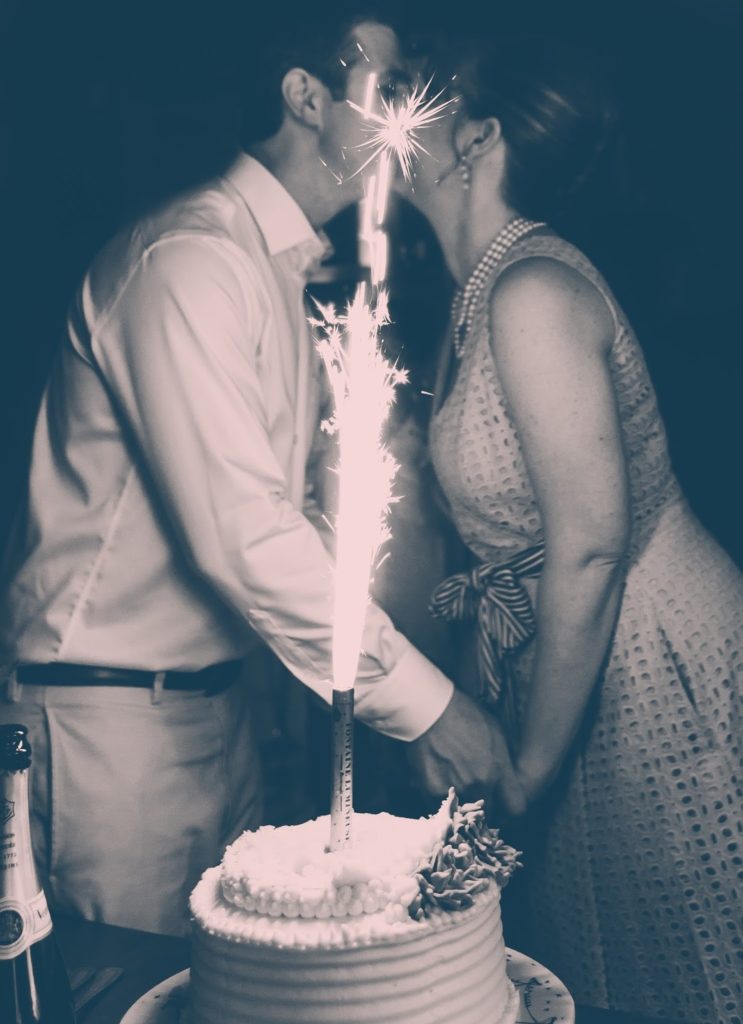
I take you ____, to be my wedded husband/wife. I promise to share my life openly with you, to speak truthfully and lovingly, to accept you fully and delight in your becoming. I will respect your uniqueness; encourage your fulfillment and support you with compassion through all the changes that life will surly bring.

